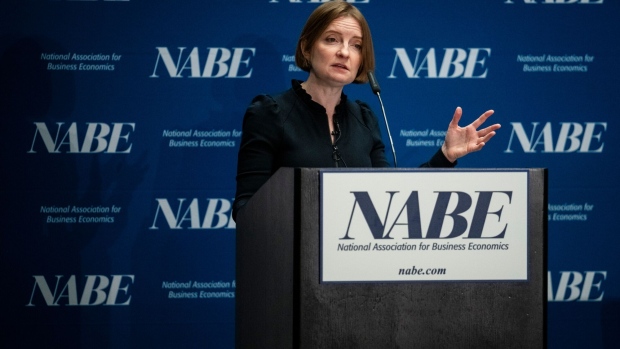Apr 16, 2024
Lombardelli Opens Door to BOE Publishing Own Interest Rate Path
, Bloomberg News

(Bloomberg) -- The Bank of England’s incoming Deputy Governor Clare Lombardelli opened the door to the central bank publishing its own interest rate projections, promising a shake-up following Ben Bernanke’s review into its forecasts.
Lombardelli said on Tuesday that she sees “advantages” to the BOE giving markets clearer guidance on where it expects borrowing costs to go with a published rate path. But she also stressed she has not come to a decision on any changes that would require “careful thought.”
“It might allow you consistency with what you’re doing. It would provide some clarity,” she told members of Parliament on the Treasury Committee. “Can I assure you there’s going to be a shakeup in response to Bernanke? Absolutely.”
She will lead the UK central bank’s response to the Bernanke review when she starts as deputy governor for monetary policy on July 1, replacing Ben Broadbent. The remarks will boost hopes that the BOE will use the review to make major changes to the way it communicates future policy with markets and households.
The Bernanke review opened the possibility of the BOE publishing a rate path but avoiding giving a firm recommendation on the idea.
Currently markets and economists are forced to interpret the BOE’s view on future borrowing costs from worded guidance and its inflation projections which are based on the market’s expectations for interest rates. Other central banks — such as the US Federal Reserve and Sweden’s Riksbank — give clearer guidance by projecting their expectations for policy.
Lombardelli said there are also “challenges” to the proposal, saying she needed to speak to staff and market participants before making a decision.
“It’s interesting, if you look around the world, some central banks do this, some don’t. There’s not really a consensus view,” she added.
The BOE has said it will provide an update on its next steps at the end of the year after the Bernanke review also criticized its infrastructure, economic models and the so-called “fan charts” that underpin its forecasts.
Lombardelli said that there were “very large errors” in forecasting across top central banks, as economic models couldn’t “cope” with a series of shocks to the economy.
“It’s a great opportunity for us to improve policymaking and communication,” she said.
©2024 Bloomberg L.P.






